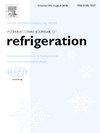Study on the impacts of refrigerant leakage on the performance and environmental benefits of heat pumps using R513A as replacement of R134a
IF 3.5
2区 工程技术
Q1 ENGINEERING, MECHANICAL
International Journal of Refrigeration-revue Internationale Du Froid
Pub Date : 2024-09-19
DOI:10.1016/j.ijrefrig.2024.09.008
引用次数: 0
Abstract
The escalating threat of global warming has highlighted the imperative to address the greenhouse effect. R513A is recognized as a viable substitute for R134a, providing a lower global warming potential (GWP) while preserving similar thermodynamic properties. However, refrigerant leakage is one of the common faults in heat pump equipment. For industrial heat pumps, refrigerant leakage can make the system less stable and affect normal industrial production, while long-term leakage can also affect the carbon emissions of the industry. When substituting refrigerants, it is crucial to consider not only their distinct properties under typical operating conditions but also the stability and environmental impact of the alternative refrigerant in cases of leakage. This paper focuses on experimentally evaluating the impact of using R513A to replace R134a on the performance of refrigeration systems under the condition of rapid refrigerant leakage. Then the life cycle climate performance evaluation (LCCP) theory is used to assist experimental results in evaluating the carbon footprints of R513A and R134a systems at different annual leakage rates. The results show that R513A has better stability than R134a when responding to rapid refrigerant leakage. This paper determines the changes in annual electricity consumption and indirect emissions under several annual leakage rates and finds that the impact of leakage on indirect emissions is also not negligible. During the utilization phase of the equipment, when leakage was taken into account, the carbon emissions of the R134a system were higher.
研究制冷剂泄漏对使用 R513A 替代 R134a 的热泵的性能和环境效益的影响
不断升级的全球变暖威胁凸显了解决温室效应问题的迫切性。R513A 被认为是 R134a 的可行替代品,它具有较低的全球升温潜能值(GWP),同时保持了类似的热力学特性。然而,制冷剂泄漏是热泵设备的常见故障之一。对于工业热泵来说,制冷剂泄漏会使系统稳定性降低,影响正常的工业生产,长期泄漏还会影响工业的碳排放。在替代制冷剂时,不仅要考虑它们在典型运行条件下的不同特性,还要考虑替代制冷剂在泄漏情况下的稳定性和对环境的影响,这一点至关重要。本文主要通过实验评估了在制冷剂快速泄漏的条件下,使用 R513A 替代 R134a 对制冷系统性能的影响。然后,利用生命周期气候性能评估(LCCP)理论辅助实验结果,评估 R513A 和 R134a 系统在不同年泄漏率下的碳足迹。结果表明,在应对快速制冷剂泄漏时,R513A 比 R134a 具有更好的稳定性。本文确定了几种年泄漏率下年耗电量和间接排放量的变化,发现泄漏对间接排放量的影响也不容忽视。在设备使用阶段,如果考虑到泄漏,R134a 系统的碳排放量更高。
本文章由计算机程序翻译,如有差异,请以英文原文为准。
求助全文
约1分钟内获得全文
求助全文
来源期刊
CiteScore
7.30
自引率
12.80%
发文量
363
审稿时长
3.7 months
期刊介绍:
The International Journal of Refrigeration is published for the International Institute of Refrigeration (IIR) by Elsevier. It is essential reading for all those wishing to keep abreast of research and industrial news in refrigeration, air conditioning and associated fields. This is particularly important in these times of rapid introduction of alternative refrigerants and the emergence of new technology. The journal has published special issues on alternative refrigerants and novel topics in the field of boiling, condensation, heat pumps, food refrigeration, carbon dioxide, ammonia, hydrocarbons, magnetic refrigeration at room temperature, sorptive cooling, phase change materials and slurries, ejector technology, compressors, and solar cooling.
As well as original research papers the International Journal of Refrigeration also includes review articles, papers presented at IIR conferences, short reports and letters describing preliminary results and experimental details, and letters to the Editor on recent areas of discussion and controversy. Other features include forthcoming events, conference reports and book reviews.
Papers are published in either English or French with the IIR news section in both languages.

 求助内容:
求助内容: 应助结果提醒方式:
应助结果提醒方式:


